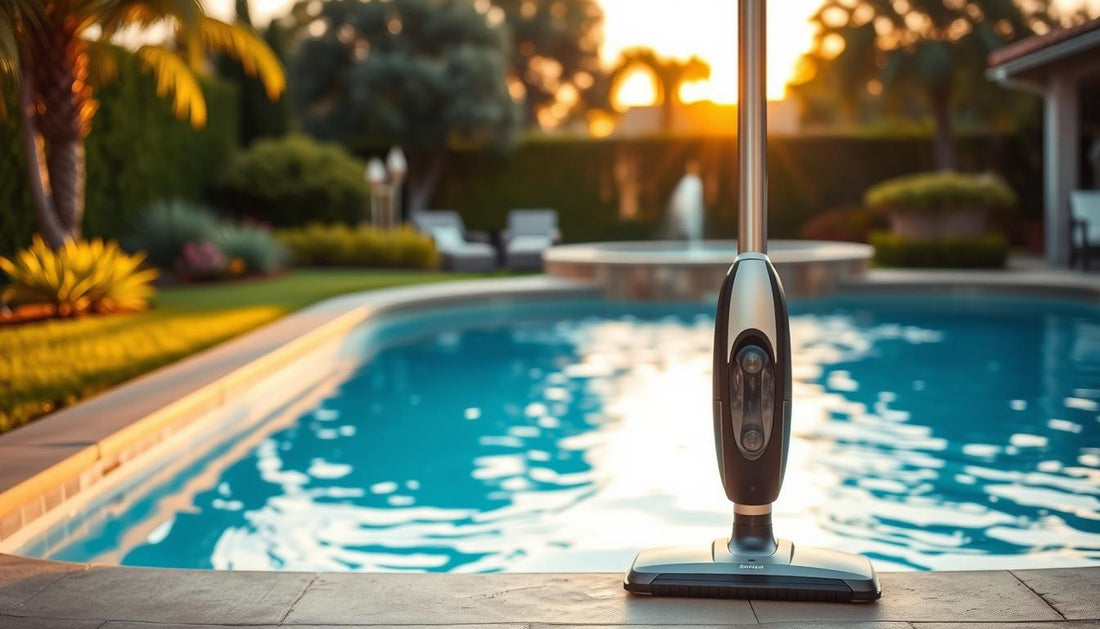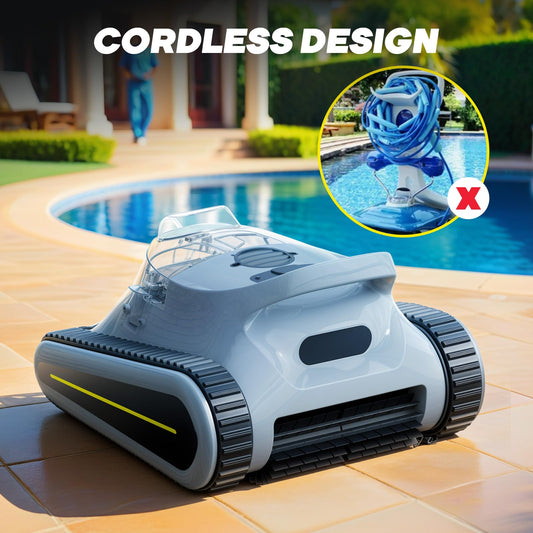
What’s the Difference Between a Pool Vacuum Cleaner and a Pool Robot?
This quote encapsulates the dynamic between a traditional pool vacuum cleaner and a sophisticated robotic pool cleaner. As you navigate the myriad of pool cleaning solutions available, it's essential to understand the key differences between these two popular options. Both devices ultimately aim to keep your pool pristine, but they operate in distinct ways, each offering unique benefits that cater to different needs. By delving into how these tools function, you'll be better equipped to choose the ideal solution for your pool maintenance requirements.

Introduction to Pool Vacuum Cleaners and Pool Robots
Maintaining a pristine swimming pool can be challenging without the right tools. Enter pool vacuum cleaners and pool robots, your ultimate allies in the relentless battle against debris, dirt, and algae. Both of these devices have gained popularity among pool owners, and it's essential to understand their unique functionalities and benefits.
Pool vacuum cleaners come in various designs, but their core function remains the same: they attach to your pool's filtration system to clean the pool's surfaces by suctioning debris. The best pool vacuum models can efficiently capture leaves, sand, and other particles, ensuring your pool remains spotless.

On the other hand, automatic pool vacuum robots are modern marvels that operate independently. Equipped with sophisticated sensors and programming, these robots not only clean every nook and cranny of your pool but also optimize the pool’s filtration and circulation. Top-rated pool cleaner reviews highlight robots like the Dolphin Nautilus and Polaris which excel in precision and efficiency, leaving no speck of dirt behind.
Knowing the fundamental differences and strengths of pool vacuum cleaners and pool robots can help you make an informed decision about which tool best suits your pool maintenance needs. This comprehensive guide will delve deeper into each type’s features, power sources, efficacy, and maintenance implications, ensuring you achieve sparkling clean pools effortlessly.
Power Source Differences
When choosing between a traditional pool vacuum cleaner and a robotic pool cleaner, the power source is a crucial factor to consider. Understanding how these devices are powered can help you make a more informed decision, whether you need an in-ground pool vacuum or an above-ground pool vacuum.
Pool Vacuum Cleaners: Using the Pool's Pump and Filter
Pool vacuum cleaners are generally designed to operate in conjunction with your pool's existing pump and filter system. By connecting to your pool’s filtration network, they utilize the power of the pump to generate suction. This method not only drives the cleaning process but also helps circulate water, enhancing the overall filtration efficacy. However, it's important to note that this can place additional strain on your pool’s pump and filter, potentially requiring more frequent maintenance.
Robotic Pool Cleaners: Independent Power Supply
In contrast, robotic pool cleaners operate using an independent electric power supply. These self-contained units are powered by plugging them into an electrical outlet, which allows them to clean without relying on your pool's pump or filter system. This independence offers several benefits, including reduced wear and tear on your pool's existing equipment and often more efficient, targeted cleaning. Nevertheless, robotic cleaners usually come with higher upfront costs and require access to a nearby power source.

We have summarized the power source differences between these two types of cleaners in the table below:
| Feature | Pool Vacuum Cleaners | Robotic Pool Cleaners |
|---|---|---|
| Power Source | Pool's Pump and Filter | Independent Electric Supply |
| Impact on Pool Equipment | Uses existing pump and filter; added strain | Reduces strain on pool's system |
| Mobility | Often limited by hose length | Typically more mobile; not hose-dependent |
| Initial Cost | Generally lower | Generally higher |
Effectiveness in Cleaning
When choosing between a traditional pool vacuum and a robotic cleaner, understanding their cleaning effectiveness is essential. Each type operates on different technologies and mechanisms to ensure your pool remains pristine.
Suction Power and Vortex Technology
Traditional pool vacuums rely heavily on suction power and vortex technology to perform their cleaning tasks. These devices use the pool's pump and filter system to generate the required suction, making them a reliable piece of pool cleaning equipment. The vortex technology aids in capturing debris efficiently, ensuring the pool remains clean and clear of dirt and leaves.
Robotic Cleaners' Precision and Efficiency
Robotic pool cleaners are known for their precision and efficiency. These top-rated pool vacuum solutions utilize advanced navigation and mapping technologies to scan and clean the entire pool. They operate independently from the pool's filtration system, providing a thorough and meticulous cleaning experience. Their ability to navigate and manage the pool environment autonomously makes them an efficient option for maintaining your pool's cleanliness.
Cost and Maintenance Considerations
Understanding the cost implications and maintenance requirements of pool vacuum cleaners versus robotic pool cleaners is crucial for homeowners. This section will break down the upfront costs, ongoing maintenance, and operational expenses of each to provide a comprehensive perspective.
Upfront Costs
When evaluating initial expenditures, pool vacuum cleaners generally have a lower price point compared to their robotic counterparts. A standard pool vacuum cleaner can be purchased for a few hundred dollars, whereas robotic pool cleaners often range from $700 to over $1,200. This price disparity makes pool vacuum cleaners an attractive option for those seeking affordable pool maintenance solutions without a significant initial investment.
Ongoing Maintenance and Operational Costs
While the initial costs are an essential consideration, ongoing maintenance and operational expenses also play a significant role. Pool vacuum cleaners typically depend on the pool’s existing pump and filtration system, which results in minimal additional operational costs. However, these devices might require more frequent manual intervention, such as routine cleaning of filters and brushes.
On the other hand, robotic pool cleaners are designed to operate independently of the pool’s filtration system. They often come equipped with advanced features like self-cleaning filters and automated scheduling. Although these features reduce the need for manual maintenance, they come at a higher ongoing cost due to occasional part replacements and the need for electricity.
For those looking at pool cleaner reviews, it's evident that both options offer distinct advantages depending on individual preferences and financial considerations. While robotic cleaners present a higher initial investment, they may offer greater convenience and efficiency over time. Conversely, traditional pool vacuum cleaners provide a more immediate, affordable solution. Ultimately, balancing the upfront and ongoing expenses is crucial for maintaining an enjoyable and cost-effective pool environment.
Pool Vacuum Cleaner
When considering the best pool vacuum for your needs, it's essential to understand how these devices function. Pool vacuum cleaners, including popular models like Kreepy Krauly pool cleaners, use the pool's existing filtration system to effectively maintain the cleanliness and clarity of the pool water.
- Simplicity: One of the standout features of pool vacuum cleaners is their simplicity. These units connect to the pool’s skimmer or dedicated suction line and leverage the pool's pump and filter. This integration allows for consistent and reliable cleaning without the need for independent motors or power supplies.
- Variety: Among the available options, Kreepy Krauly pool cleaners are renowned for their efficiency and durability. They offer a variety of models tailored to different pool sizes and types, ensuring there is a perfect fit for your specific needs.
- Maintenance: Maintaining a pool vacuum cleaner is straightforward. Regular cleaning of the filter and periodic checks of the hose and scrubbers can keep the unit functioning optimally for many years.
In summary, choosing the best pool vacuum involves assessing your pool’s requirements and selecting a reliable model, such as those from the Kreepy Krauly lineup. Their ability to harness the pool's existing systems makes them a practical choice for any pool owner.
Effort and Ease of Use
When considering pool cleaning solutions, the effort and ease of use are critical factors. The comparison between an automatic pool vacuum and robotic cleaners reveals key differences in user experience.
Set-and-Forget vs. Manual Intervention
Robotic pool cleaners often provide a set-and-forget experience. These devices run autonomously, covering the pool with minimal oversight. Simply set the machine, and let it do the work while you relax.
Conversely, an automatic pool vacuum requires more hands-on involvement. Though efficient, it demands periodic manual adjustments and monitoring, which can detract from the ease of ownership.
Maintenance Requirements
In terms of maintenance, robotic cleaners generally require less frequent upkeep. Modern models include features that make them easier to clean and maintain, resulting in easy pool maintenance.
However, an automatic pool vacuum can involve more regular maintenance. Ensuring the pump and filter are functioning correctly is essential for sustained performance and longevity.
Impact on Pool Circulation
Maintaining proper water circulation in your pool is crucial for ensuring hygiene and preventing stagnation. Each type of pool cleaner affects water circulation differently, contributing to overall *pool circulation systems* efficiency.
Suction Cleaners and Pool Filtration
Suction cleaners rely on the pool's existing filtration system to operate. They attach to the skimmer or a dedicated suction line, drawing debris into the pool's filter. By working directly with the pool's filtration system, these cleaners not only help in debris removal but also promote constant water movement through the filter, enhancing the pool's cleanliness. Integrating these cleaners with the filtration system is aligned with *best pool cleaning practices*, ensuring contaminants are continuously filtered out.
Robotic Cleaners and Water Circulation
Robotic cleaners operate independently of the pool's pump and filter, using their own filtration system. They draw water in and expel it back out after removing debris, thus contributing to water circulation without overloading the pool's primary filtration system. This independent operation can lead to more comprehensive water coverage, as the cleaner moves around the pool, ensuring even distribution of chemicals and reducing dead spots where algae may form. Leveraging robotic cleaners aligns with *best pool cleaning practices* for effective management of *pool circulation systems*.
| Criteria | Suction Cleaners | Robotic Cleaners |
|---|---|---|
| Integration with Filtration | Direct connection, enhances filtration | Independent system, doesn't burden filtration |
| Water Circulation | Promotes movement through the skimmer | Ensures even chemical distribution, reduces dead spots |
| Debris Handling | Uses pool's filter | Internal, removable filter |
Which One Is Right for You?
Deciding between a pool vacuum cleaner and a pool robot involves considering several key factors. One primary consideration in your pool cleaner selector is your pool's shape and specific features. If your pool has intricate designs, stairs, or varying depths, a robotic pool cleaner offers greater adaptability and precision. Their independent power supply and advanced navigation technology allow them to clean every nook and cranny, enhancing overall efficiency.
Your budget and maintenance preferences also play crucial roles in this decision. While pool vacuum cleaners typically involve a lower initial investment, they require manual operation and frequent maintenance. In contrast, robotic pool cleaners come with a higher upfront cost but offer set-and-forget convenience and lower ongoing maintenance, making them an attractive choice if ease of use is a priority.
Finally, consider the cleaning efficiency you need. If maintaining crystal-clear water with minimal effort is your goal, robotic cleaners are unmatched in their precision and thoroughness. However, if you prefer a budget-friendly approach and don't mind a bit of manual intervention, a pool vacuum cleaner can still achieve satisfactory results. Remember, using the right pool cleaner selector ensures you match your pool shape considerations and maintenance needs for optimal performance.
